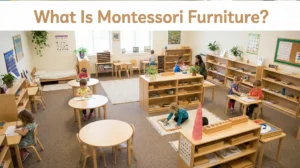Looking for a comprehensive list of daycare supplies to keep your children happy and engaged? Running a daycare center can be a fun and rewarding experience, but it comes with its fair share of challenges. One of the most daunting tasks can be getting all the necessary supplies to keep your children happy, engaged, and safe.
In our daycare supplies list, you’ll find all the necessities to create a safe and stimulating environment for children of all ages. We’ve gathered everything you need from basics like diapers and wipes to educational materials and play equipment.
Having the right childcare supplies is crucial to providing a nurturing environment for your children and building trust with parents. I have compiled a comprehensive daycare supply list based on years of industry experience and feedback from clients worldwide. This list of daycare supplies is based on close collaboration with top suppliers and daycare centers. It covers everything from furniture to educational materials, ensuring daycare providers have everything they need to create a safe, engaging, nurturing environment for children.
Creating Daycare Supplies List
Creating daycare supplies list involves considering various aspects, from health and safety supplies to educational materials and toys. This guide covers all essential items, helping you create a well-equipped daycare that meets all the needs of the children in your care.
- Health and Safety Supplies
- Daycare Furniture and Equipment
- Cleaning Supplies
- Child Care Supplies
- Educational Materials
- Daycare Toys
- Daycare Technology Supplies
Health and Safety Supplies
Health and safety are the top priorities in any daycare setting. Ensuring a clean and safe environment for children is paramount. Here’s a detailed look at the essential health and safety supplies your daycare needs:
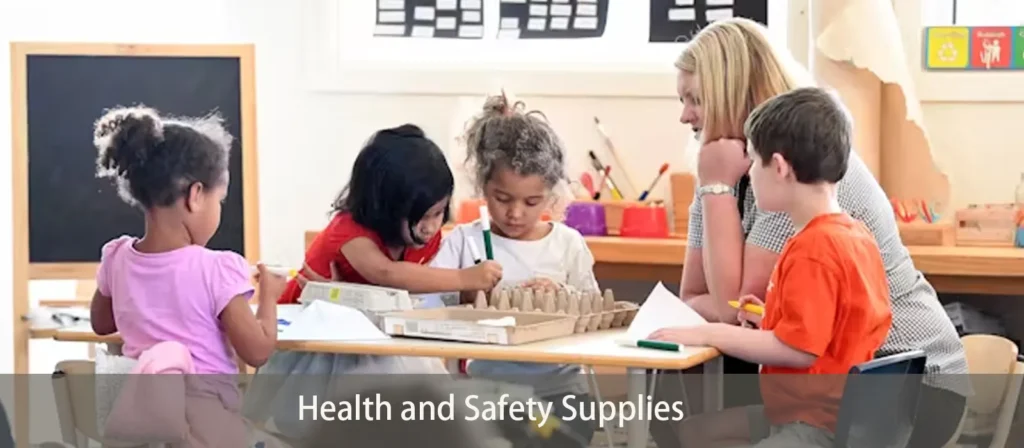
- First Aid Kits: Equipped with basic medical supplies, kits are essential for responding to minor injuries and emergencies.
- Smoke Detectors: Smoke detectors provide early warnings during a fire, giving you precious time to evacuate.
- Carbon Monoxide Detectors: These detectors alert you to harmful carbon monoxide gas, which is odorless but potentially fatal.
- Fire Extinguishers: Fire extinguishers are necessary to control small fires before they escalate quickly.
- Emergency Flashlights: Flashlights are crucial during power outages or emergencies, providing light when needed most.
- Batteries: Always have spare batteries for critical devices like smoke detectors, flashlights, and other safety equipment.
- Safety Gates: Safety gates help prevent children from accessing unsafe areas, such as stairs or kitchen zones.
- Window Guards: Window guards help to prevent children from falling or climbing out of windows, ensuring their safety indoors.
- Outlet Covers: Outlet covers prevent children from inserting objects into electrical outlets, reducing the risk of electrical shocks.
- Corner Protectors: These soft covers can be attached to sharp corners of furniture to prevent injuries from falls.
- Security Cameras: Security cameras help monitor and ensure the safety of children, staff, and the daycare premises in real-time.
- Air Purifiers: Air purifiers help maintain clean air by filtering allergens, dust, and pollutants, ensuring a healthier environment for children.
Daycare Furniture and Equipment
The right daycare furniture and equipment are crucial for creating a functional and inviting daycare environment. Here’s a comprehensive list:
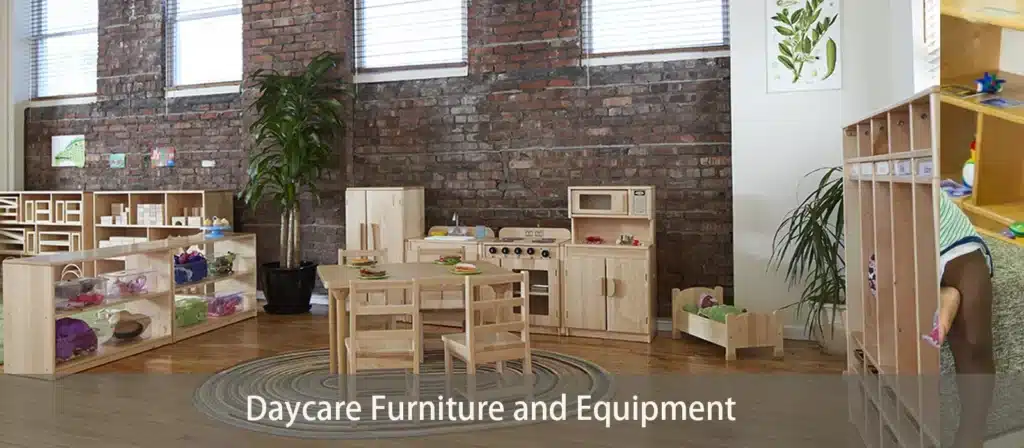
- Child-sized Tables and Chairs: These appropriately sized tables and chairs help children comfortably engage in activities like eating, drawing, and crafting.
- Nap Mats or Cots: Comfortable nap mats or cots provide children with a safe and cozy place to rest during nap time.
- Storage Units: Storage units keep toys, books, and supplies organized, making it easy for caregivers to access and maintain a tidy space.
- Bookshelves: Bookshelves are perfect for storing children’s books, promoting literacy while keeping the learning environment neat.
- Cribs or Toddler Beds: Cribs or toddler beds ensure safe and secure sleeping arrangements for younger children during naps or overnight stays.
- High Chairs: High chairs are essential for safely feeding infants and toddlers during meals.
- Play Kitchens: Play kitchens inspire imaginative play and learning, allowing children to mimic real-life activities and develop social skills.
- Activity Mats: Activity mats provide a safe, soft surface for babies and toddlers to explore, encouraging sensory development and motor skills.
- Indoor Play Structures: Indoor play structures offer children opportunities to climb, crawl, and explore, promoting physical activity and coordination.
- Outdoor Playground Equipment: Playground equipment such as slides, swings, and climbing frames helps children develop physical strength and social interaction outdoors.
- Art Easels and Craft Tables: Art easels and craft tables provide children with the space and tools to engage in creative activities like painting, drawing, and crafting.
- Sensory Tables: They allow children to explore different textures and materials, stimulating their senses and fostering hands-on learning.
- Lockers or Cubbies: Lockers or cubbies provide a dedicated space for children to store personal items, such as coats, bags, and shoes.
- Sofas: Comfortable sofas offer a relaxed seating area for children to rest, read, or socialize in a calm environment.
- Bean Bags: Bean bags provide a cozy, flexible seating option for children to relax or play quietly.
- Diaper Changing Stations: Diaper changing stations are designed to ensure safe, efficient, and hygienic diaper changes for infants and toddlers.
- Bulletin Boards and Display Panels: Bulletin boards and display panels help showcase children’s artwork, announcements, or important information for parents and caregivers.
- Carpeted Areas or Rugs: Soft carpeted areas or rugs provide a safe, comfortable space for children to sit, play, and engage in floor activities.
Daycare Cleaning Supplies
Maintaining a clean and hygienic environment is fundamental in a daycare. Here’s what you’ll need to keep your space spotless and germ-free:
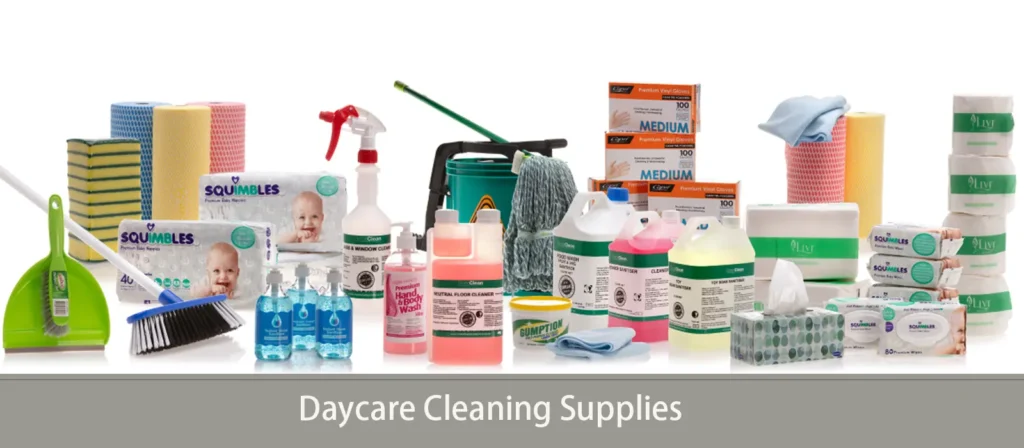
- Sanitizing Wipes: Sanitizing wipes are quick and effective for cleaning surfaces and wiping down toys, tables, and high-touch areas to kill germs and bacteria.
- Hand Sanitizer: Hand sanitizer is essential for sanitizing hands quickly, especially when soap and water aren’t available, to prevent the spread of germs.
- Paper Towels: Paper towels are essential for wiping surfaces, cleaning spills, drying hands, and helping maintain hygiene throughout the daycare.
- Toilet Paper: Toilet paper is necessary to maintain hygiene in restrooms and ensure children and staff access a clean and sanitary environment.
- Garbage Bags: Garbage bags are necessary for disposing of waste efficiently and keeping trash bins clean and odor-free throughout the daycare.
- Sponges: Sponges are ideal for scrubbing surfaces like counters, sinks, and toys, ensuring thorough cleaning in areas where dirt and grime may build up.
- Mops: Mops are essential for cleaning floors, helping to remove dirt and spills while keeping the daycare floors hygienic and safe for children.
- Brooms: Brooms are necessary for sweeping up dust, dirt, and debris from floors and corners to maintain cleanliness in high-traffic areas.
- Disposable Gloves: Disposable gloves protect caregivers and staff when cleaning, handling waste, or changing diapers, ensuring hygiene and reducing the risk of contamination.
- Air Freshener: Air fresheners help maintain a pleasant and fresh-smelling environment, masking any odors and contributing to a clean and welcoming atmosphere.
- General Cleaners: General-purpose cleaners are important for disinfecting and cleaning various surfaces, including countertops, furniture, and floors, to prevent the spread of germs.
Child Care Supplies
These supplies ensure the daily needs of children are met, providing comfort and convenience:
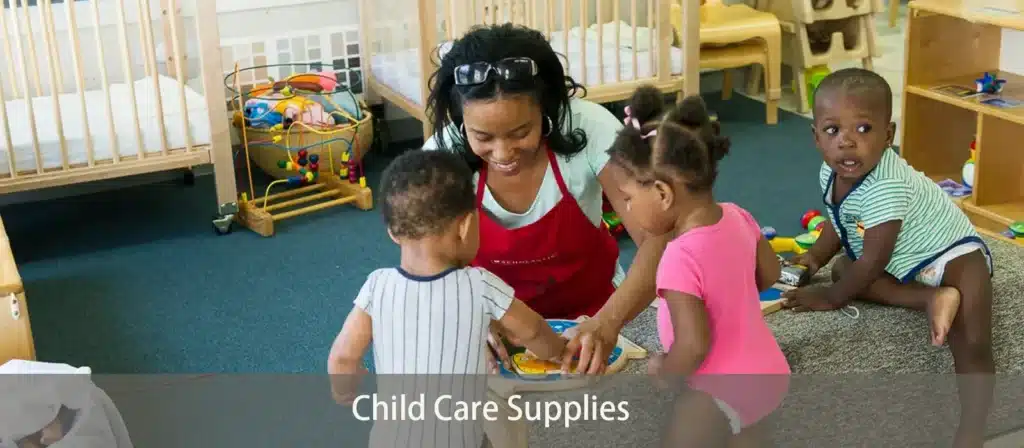
- Diapers of All Sizes: Diapers in various sizes are essential for keeping infants and toddlers dry, clean, and comfortable throughout the day.
- Hand Sanitizer: Hand sanitizer is vital for quick hand hygiene, especially when soap and water are unavailable, helping reduce the spread of germs.
- Baby Bottles and Formula: Baby bottles and formula are necessary for feeding infants and ensuring they receive proper nutrition in daycare.
- Blankets and Pillows: Soft blankets and pillows provide comfort during nap time, ensuring children rest peacefully and stay warm.
- Changing Pads: Changing pads offer a clean, comfortable surface for diaper changes, making the process more efficient and hygienic for children and caregivers.
- Bibs: Bibs are important for keeping children clean during meals and protecting their clothing from spills and stains.
- Pacifiers: Pacifiers offer comfort and soothing to babies, helping them calm down during nap time or moments of distress.
- Cribs and Cribs: Cribs and toddler beds are essential for safe and secure sleeping arrangements for young children, promoting rest and well-being.
- Spare Clothing: Spare clothing is necessary in case of spills, accidents, or diaper leaks, ensuring children stay clean and comfortable throughout the day.
- Toiletries: Toiletries, including baby shampoo, soap, and lotion, are needed to maintain hygiene during bath time and ensure the skin stays soft and healthy.
Educational Materials
Educational materials are key to fostering cognitive and social development in children. Here’s what you need to include in your daycare:
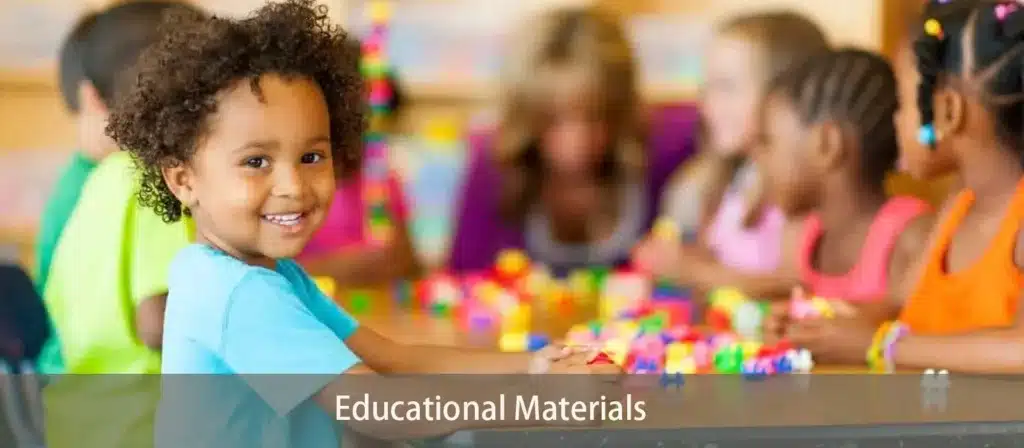
- Books: Books are fundamental for developing language skills, promoting literacy, and encouraging imagination and storytelling in children.
- Puzzles: Puzzles aid in cognitive development, helping children improve problem-solving, spatial reasoning, and fine motor skills.
- Building Blocks: Building blocks promote creativity, hand-eye coordination, and social skills as children learn to build structures and collaborate.
- Flashcards: Flashcards reinforce vocabulary, shapes, numbers, and letters, making learning fun and interactive.
- Art Supplies: Art supplies such as crayons, markers, and paints encourage creative expression and help children develop fine motor skills.
- Craft Materials: Craft materials, including glue, scissors, and paper, support hands-on learning and allow children to engage in imaginative projects.
- Musical Instruments: Musical instruments help children explore rhythm, sound, and music, fostering creativity and improving auditory skills.
- Playdough: Playdough encourages sensory play and creativity, enhancing fine motor skills as children shape and mold different figures.
- Sensory Boxes: Sensory boxes filled with various textures and materials engage children’s senses, fostering curiosity and cognitive development.
- Number Pads: Number pads help young children recognize and practice numbers, providing a fun way to introduce basic math concepts.
- Science Kits: Science kits offer hands-on experiments that spark curiosity, encouraging exploration and learning about the natural world.
- Drama Costumes: Drama costumes foster imaginative play and storytelling, helping children develop social and emotional skills through role-playing.
- Maps and Globes: Maps and globes introduce children to geography, helping them understand the world around them and fostering spatial awareness.
- Language Learning Materials: Language learning materials support vocabulary building and language comprehension, enhancing children’s communication skills.
- Math Learning Tools: Math learning tools, like counters, abacuses, and number games, help children grasp basic math concepts in a hands-on, engaging way.
- Educational Posters: Educational posters provide visual reminders of key concepts like the alphabet, numbers, shapes, and colors, reinforcing learning in a fun way.
Daycare Toys
Toys are essential for play and learning. Here’s a detailed breakdown of necessary indoor and outdoor toys for a daycare:
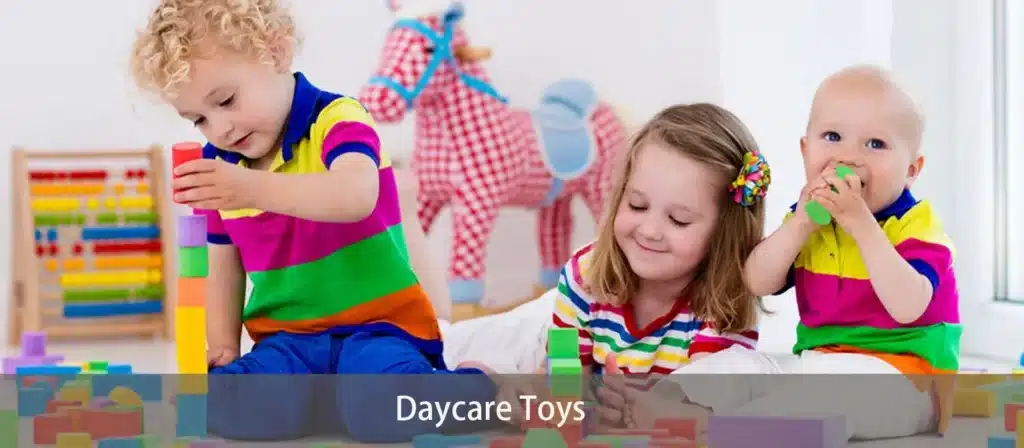
Indoor Toys
Indoor toys are vital for engaging children in activities that promote cognitive and motor skills. Here’s a comprehensive list:
- Building Blocks: Building blocks stimulate creativity and problem-solving, helping children develop fine motor skills and spatial awareness as they build structures.
- Dollhouses: Dollhouses encourage imaginative play, social interaction, and storytelling, allowing children to create their worlds and scenarios.
- Art Supplies (crayons, markers, paint): Art supplies foster creativity and self-expression, allowing children to explore colors, shapes, and textures while developing fine motor skills.
- Play Kitchens: Play kitchens inspire imaginative play and role-playing, allowing children to mimic real-life activities and learn about social interaction and cooperation.
- Dress-up Clothes: Dress-up clothes promote imaginative play and help children develop social and emotional skills as they role-play different characters or professions.
- Toy Cars and Trucks: Toy cars and trucks encourage imaginative play and improve hand-eye coordination while providing opportunities for children to explore movement and speed.
- Plush Animals: They provide comfort and companionship while promoting imaginative play and emotional development as children care for their toys.
- Board Games: Board games are excellent for teaching children social skills like turn-taking, cooperation, and following rules while enhancing cognitive skills like counting and strategy.
- Musical Instruments: Musical instruments allow children to explore rhythm and sound, fostering creativity and developing auditory skills as they engage in musical play.
- Puppets: Puppets encourage imaginative play, storytelling, and social interaction, allowing children to express emotions and ideas creatively.
- Books: Books are essential for developing language skills, promoting literacy, and encouraging a love for reading and storytelling from a young age.
- Magnetic Letters and Numbers: Magnetic letters and numbers help children recognize letters, numbers, and basic words, making early learning fun and interactive.
- Sensory Toys (squishy balls, textured mats): Sensory toys provide tactile stimulation, support sensory development, and help children explore different textures, shapes, and sizes through hands-on play.
- Playdough and Modeling Clay: Playdough and modeling clay enhance creativity and fine motor skills, allowing children to shape, mold, and create, fostering imaginative and tactile play.
Outdoor Toys
Outdoor play is essential for physical development and overall well-being. Here’s a detailed list of necessary outdoor toys:
- Sandboxes: Sandboxes provide an open space for children to dig, build, and explore, fostering creativity and improving fine motor skills through tactile play.
- Water Tables: Water tables offer sensory play with water, helping children explore concepts like volume, pouring, and water flow while promoting fine motor development.
- Bicycles and Tricycles: Bicycles and tricycles support physical fitness by enhancing balance, coordination, and leg strength, encouraging outdoor exercise and independent play.
- Playgrounds with Slides and Swings: Slides and swings promote physical activity, balance, and coordination, allowing children to be active and social with peers.
- Climbing Frames: Climbing frames help children develop strength, coordination, and problem-solving skills as they climb, crawl, and explore different heights.
- Soccer Balls, Basketballs: Balls like soccer and basketball help children develop gross motor skills, coordination, and teamwork, encouraging outdoor sports and active play.
- Jump Ropes: Jump ropes are great for developing coordination, balance, and cardiovascular fitness while fostering fun and challenging group games.
- Frisbees: Frisbees improve hand-eye coordination and teamwork as children engage in throwing and catching, encouraging outdoor play and active movement.
- Scooters: Scooters promote balance, coordination, and leg strength, offering children an exciting way to move around and enjoy outdoor exercise.
- Tunnels: Tunnels provide fun, active play and help improve spatial awareness, coordination, and motor skills as children crawl, roll, or hide inside them.
- Balance Beams: Balance beams enhance coordination and balance by challenging children to walk across narrow surfaces, promoting body control and physical confidence.
- Garden Exploration Kits: Garden exploration kits engage children in outdoor learning, fostering an interest in nature as they explore plants, insects, and soil hands-on.
- Kites: Flying kites help children develop hand-eye coordination, focus, and patience, offering a fun and exciting way to enjoy the outdoors.
Daycare Technology Supplies
Incorporating technology into the daycare can enhance learning and streamline operations. Here’s what you need:
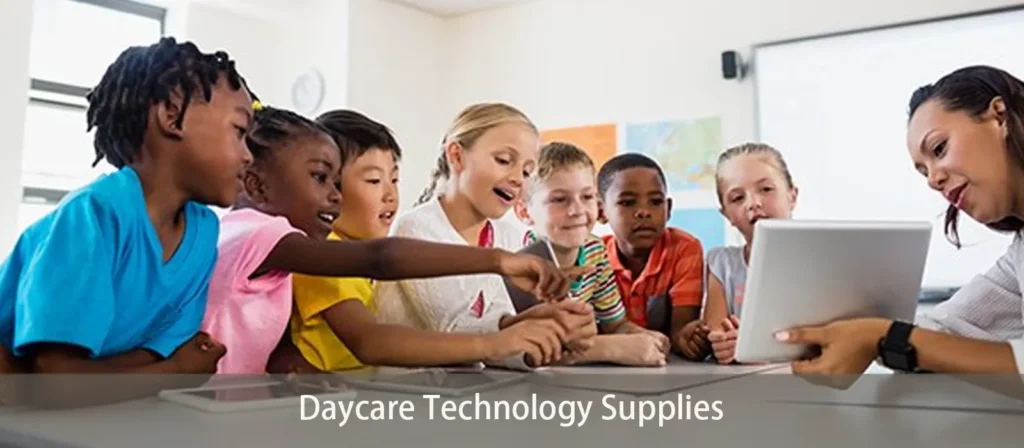
- Tablets and Computers: Tablets and computers facilitate digital learning and administrative tasks, offering children interactive educational apps and teachers tools for managing daily operations.
- Projectors and Screens: Projectors and screens enhance learning experiences by displaying videos, slideshows, and interactive lessons, helping engage children in visual and auditory learning.
- Cameras: Cameras, including security cameras and webcams, help monitor the daycare environment, ensuring safety and allowing parents to view their children’s activities remotely.
- Management Software: Daycare management software helps streamline scheduling, attendance tracking, billing, and communication between staff and parents, improving efficiency and organization.
- Printers and Copiers: Printers and copiers are essential for printing educational materials, newsletters, and important documents, allowing staff to manage paperwork and communication efficiently.
- Audio Equipment: Audio equipment, such as speakers and microphones, is useful for playing music, conducting lessons, or communicating with large groups, ensuring clarity and engagement.
- Interactive Whiteboards: Interactive whiteboards provide a dynamic learning tool, allowing teachers to present lessons interactively and children to engage in hands-on activities that stimulate learning.
- Televisions: Televisions effectively show educational programs, documentaries, or interactive lessons that enhance learning through visual content.
- Digital Thermometers: Digital thermometers offer quick and accurate temperature readings, ensuring that children’s health is monitored regularly for early detection of illness.
- Emergency Communication Devices: Emergency communication devices, such as walkie-talkies or mobile phones, ensure that staff can communicate efficiently in emergencies, helping coordinate responses and maintain safety.
Where Do I Buy Daycare Furniture and Supplies?
At Xiha Montessori, we offer you a full range of services, with more than 20 years of experience in the education industry, to furnish your classroom and give you professional advice.
Our bespoke service can be tailored to meet any of your needs and we offer a range of classroom products, from consultancy on classroom design to furniture delivery. We make it easy for you to complete your purchasing program!
What Age Is Best for Daycare?
Determining the best age for a child to start daycare can be challenging and depends on various factors, including the child’s development, family needs, and the quality of the daycare. Here’s an overview to help you decide:
- Infants (0-12 months): While daycare for infants is available, finding a center with a low caregiver-to-child ratio and specialized infant care programs is crucial. Some parents prefer to wait until their child is older.
- Toddlers (1-3 years): Many experts believe this is an ideal age for starting daycare. Toddlers benefit from social interaction, structured activities, and early learning experiences. Daycare can also help with routine and structure.
- Preschoolers (3-5 years): Daycare for this age group often focuses on preparing children for kindergarten. Programs typically include early education, social skills development, and enrichment activities.
Factors to Consider:
- Child’s Temperament: Some children adapt well to new environments, while others may need more time.
- Family Situation: Work schedules, financial considerations, and support networks all play a role.
- Daycare Quality: The quality of the daycare, including staff qualifications, curriculum, and facilities, is critical.
Is Daycare Good for Infants?
The decision to place an infant in daycare is significant and often accompanied by many questions and concerns. Here’s an in-depth look at the benefits and considerations:
Benefits of Daycare for Infants:
- Socialization: Infants in daycare have the opportunity to interact with peers, which can promote social development and early friendships.
- Routine and Structure: Daycares provide a consistent schedule, which can help infants feel secure and develop regular sleeping and eating patterns.
- Stimulating Environment: Quality daycares offer various activities and sensory experiences that can aid in cognitive and motor skill development.
- Professional Caregivers: Trained staff can provide expert care, monitor developmental milestones, and promptly address concerns.
- Parental Support: Daycare can offer parents a support network, connecting them with other parents and providing resources and guidance.
Considerations:
- Health and Safety: Ensure the daycare follows strict health and safety protocols to protect infants from illness and injury.
- Caregiver-to-Child Ratio: A low ratio is crucial for personalized care and attention.
- Facility Cleanliness: Cleanliness standards must be high to prevent the spread of germs.
- Emotional Readiness: Assess your and your baby’s readiness for the transition. Separation anxiety is normal and can be managed with proper support.
Daycare can be beneficial for infants if the right environment is provided. Thorough research and careful selection of a daycare that meets high standards can ensure a positive experience for both the infant and the parents.
Conclusion
Sort through your daycare supply list and equip your daycare center with appropriate, safe, attractive and educational daycare supplies.
Each element is vital, from health and safety supplies to educational materials. Ensure you choose reliable suppliers and stay updated with industry trends to provide the best for your daycare.








